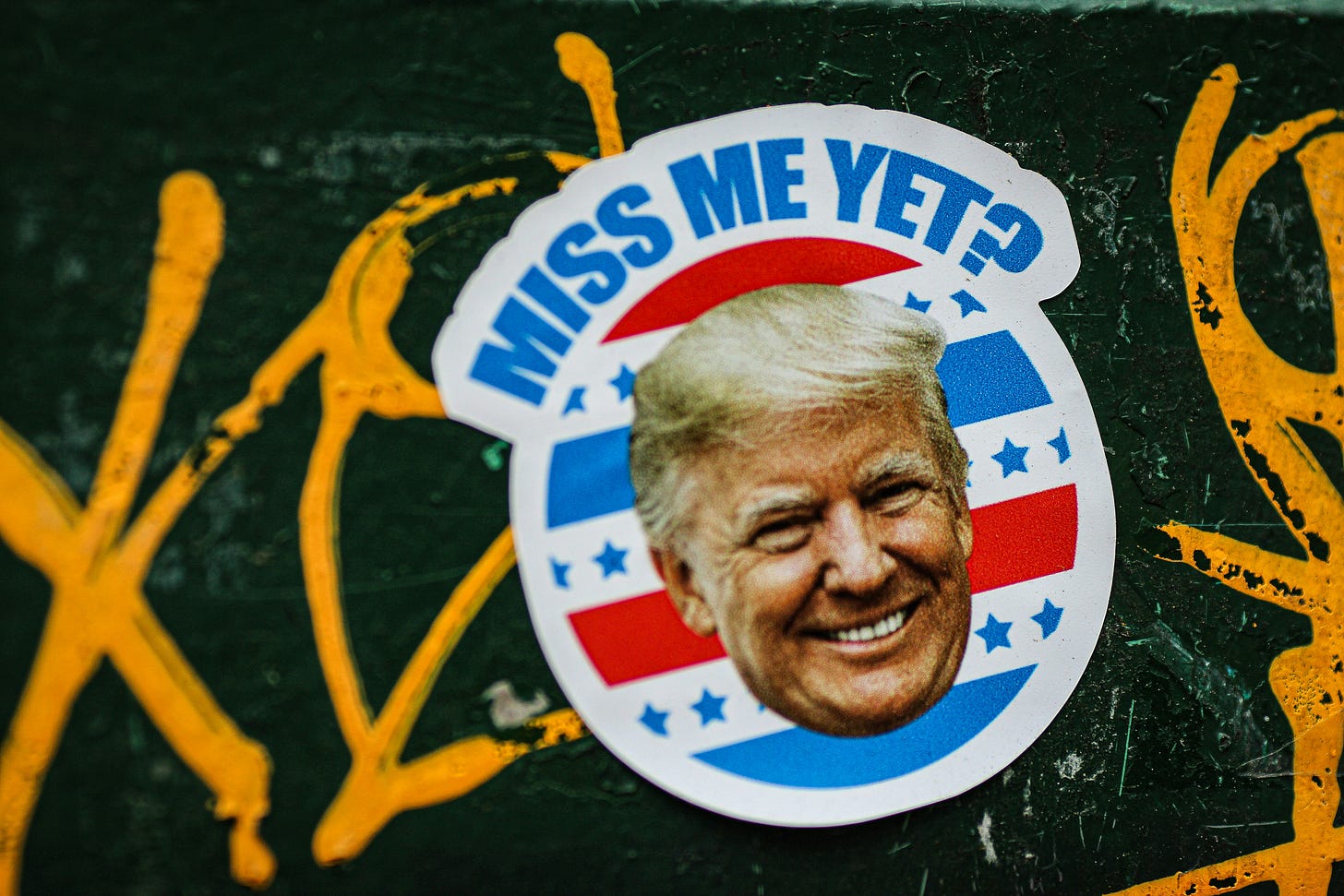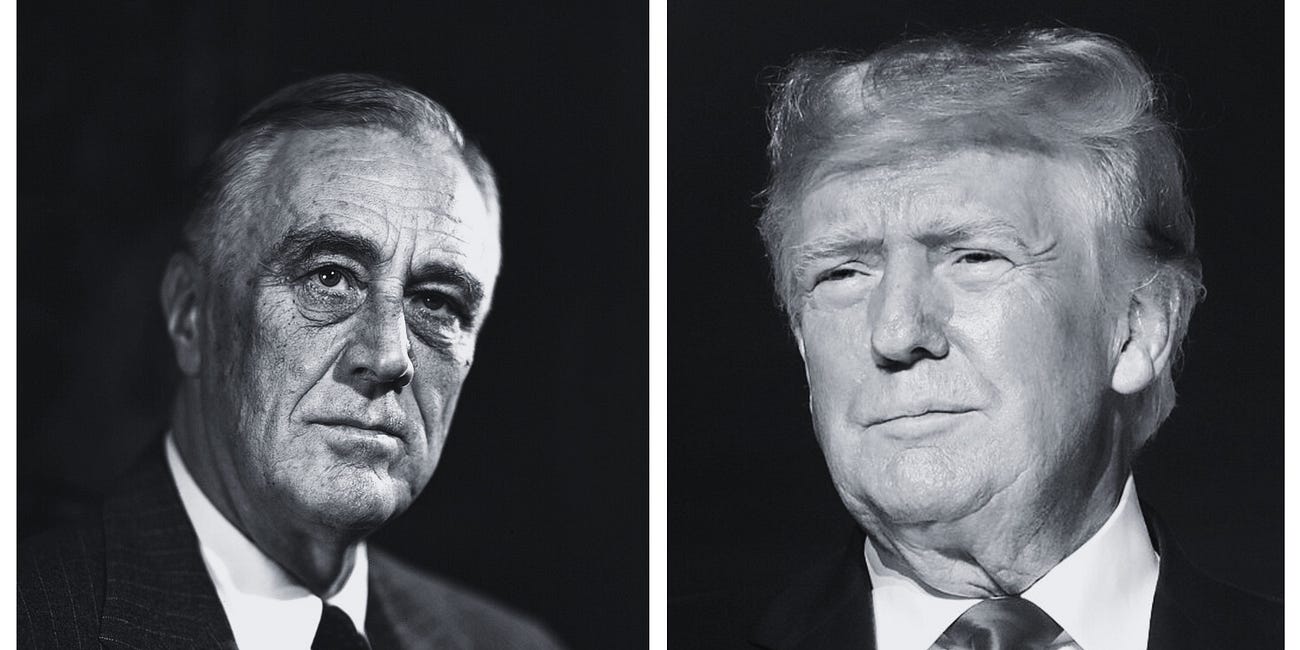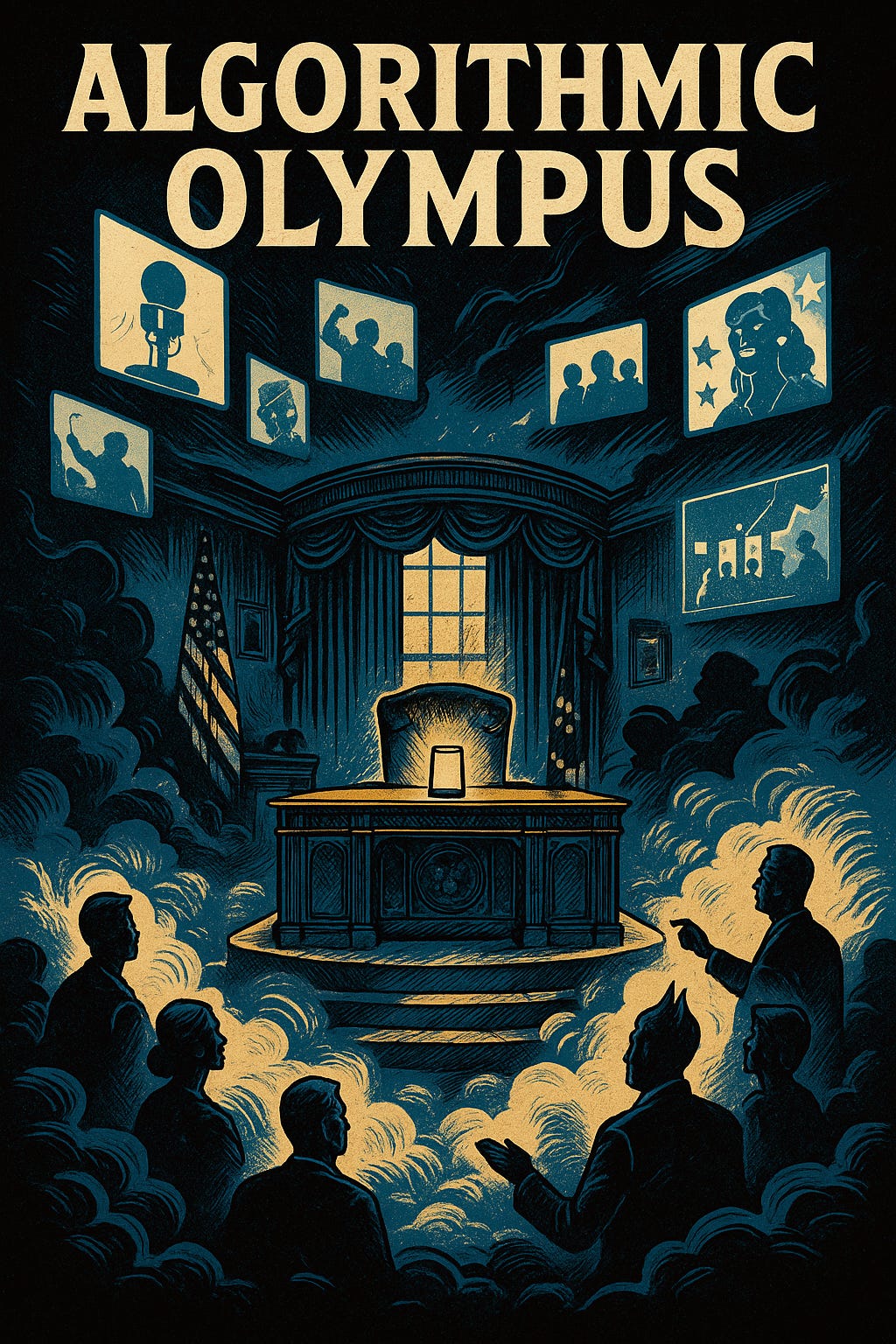
This summer, I wrote an essay about how Trump is the funhouse mirror of FDR. I meant that in the way Franklin Roosevelt represented a nation crystallizing after generations of fighting for a better social contract, Trump represents a nation that benefited from those fights but now unravels under the comfort and selfishness of a society that is more restless giant than living through its finest hour.
Back then, I thought I was diagnosing a phase; turns out I was describing a prototype.
Read the essay from this summer here:
I went back to reflecting on that essay as we close out a week where the East Wing of the White House seemingly disappeared into a mess of incinerated red tape. It’s a complete reversal of the crystallized bureaucracy that Roosevelt embodied — for better and for worse. The Sphinx himself, that master of quiet calculation and impenetrable calm, once expanded the same wing to house Eleanor and her band of reformers. Now the structure’s gone, replaced by donor checks and renderings of a ballroom that looks like Versailles with better Wi-Fi.
But that’s the point, isn’t it?
Trump may end up being the most impactful president of my lifetime, like the Sphinx was for my grandparents’ generation, not because of his virtue but because of his visibility. His success is defined by how much he’s raised a funhouse mirror to the so-called adults in the room and forced them to narrate his administration’s daily, and in some people’s view, extralegal escapades while pretending that none of it was serious because the right people weren’t the ones doing it. The game was always power, and the handshake deal replaced the blueprint.
We’ve seen it again and again this fall, the demolition of the East Wing, yes, but also the Club World Cup fiasco, where the president was booed by a global crowd and his media team spun it as patriotic performance art. We’ve reached the point where being booed abroad counts as proof of strength at home; the algorithm runs on humiliation converted into clicks.
And in the streets, the “No Kings” protests have filled the avenues with the sound of a nation chanting at its own reflection. Even rebellion now comes in portrait mode. The crowd yells “No Kings,” but the feed keeps crowning new ones every fifteen seconds. Half the country’s marching, the other half’s refreshing the livestream, and everyone’s convinced they’re the main character.
Meanwhile, the machinery of government continues, just… differently. Less about deliberation, more about tempo. Policies announced like product drops, agencies turned into avatars of personality. Diplomacy as duet. The ambassador’s note is now a quote-tweet.
And still, the pundits gather like weary anthropologists, squinting at the ruins and insisting that civilization is fine if you ignore the smoke. Our analysts keep writing think-tank fan fiction about the return of norms, a kind of Beltway Narnia where civility still roams free.
A lot of this was made possible by a limited imagination, America’s persistent class systems around race, gender, sexual orientation, and geography. We keep seeing ourselves as a picture book of upward mobility, not a modern empire with the broad strokes of nuanced terror that define every civilization that ever thought it was different. There’s a certain naivete, or cynical design, that connects the old New Deal restoration to this moment’s hollowing-out. Both were transformations born of crisis; both relied on myth to sell power as progress.
And now we find ourselves in a post-mythic age where even the cynicism feels nostalgic. Every pundit and protester, every donor and data-miner, is performing a role in a system that no longer believes its own script. We used to debate how democracy dies; turns out it just rebrands and keeps streaming.
So yes.
I’m starting to think this administration will be a marketed success, despite the protests, despite the lawsuits, despite the institutional heartburn. Not because it’s right or wrong. But because Trump revealed the unseriousness behind the serious faces, the columnists, prognosticators, representatives, and courtiers of consensus. He ripped the mask off, and the machinery kept running anyway.
Maybe that’s the real revelation: the machine still hums, but it’s been reprogrammed. The blueprint gave way to the algorithm. The fireside became the feed. Roosevelt built new rooms into the American house; Trump tore down the walls to show us they were hollow.
He’s less a politician now than a content genre, renewed for another season because outrage still tests well.
And maybe that’s our inheritance: to live in the age of performance, not management.
The lights are on, the stage is crowded, and the audience can’t look away.
The rest of us are just trying to find a seat before the next act begins.








The whole purpose of the ball room is to claim the White House as his own. Trump is a renter, and cannot renovate the building, but by tearing down the White House and building a ball room (who in the 21st Century even throws balls?), along with guilding the Oval Office and turning it into a Offal Office, and plant two phallic symbols in front of and behind the White House, he is telling us that 22nd Amendment be damned he is not going anywhere except on a gurney.
And for those who want to believe that the constitution will protect us, look what he has done so far
Article I, Section 9: Emoluments Clauses
The Constitution includes two anti-corruption clauses known as the Emoluments Clauses. The Foreign Emoluments Clause prohibits any federal officeholder from accepting gifts or benefits from foreign states without congressional consent. The Domestic Emoluments Clause prevents the president from receiving any other salary or benefit from the United States or any individual state.
Article I, Section 8: Congress's power of the purse
This section gives Congress the authority to control federal spending.
Accusation: During his presidency, Trump was accused of violating this principle by attempting to block or "impound" Congressionally appropriated funds for his political ends.
Article II, Section 1: Presidential term limits (22nd Amendment)
The 22nd Amendment limits a person to two terms as president.
Accusation: Trump has repeatedly mused about serving a third term or finding "methods" to bypass this limit. Legal experts say this position disregards a fundamental constitutional amendment.
Article II, Section 2: Appointments Clause
This section requires the president to obtain the "advice and consent of the Senate" for the appointment of certain officers.
Accusation: Trump was accused of violating this by firing inspectors general (federal watchdogs) without providing the legally required 30-day notice to Congress.
Article II, Section 3: Presidential oversight of elections
This section outlines the president's duties, but gives no authority over federal election administration, which is managed by states.
Accusation: Following the 2020 election, Trump challenged state-certified election results and pressured officials to "find" votes to overturn his defeat.
1st Amendment: Freedom of speech and the press
The First Amendment protects freedoms of speech, expression, and the press.
Accusation: Trump's administration has been criticized for retaliating against critics, including threatening law firms and attempting to sanction journalists.
5th and 14th Amendments: Due Process and Equal Protection
These amendments guarantee all citizens due process of law and equal protection.
Accusation: Trump's attempts to end birthright citizenship via executive order were immediately blocked by federal judges who found the action to be a "blatant" violation of the 14th Amendment.
Obstruction of Justice
While not a specific article, the concept of obstruction of justice is a constitutional concern related to abuses of executive power.
Accusation: This was a key part of the investigation into Russian interference and the Mueller Report. Critics argued Trump's firing of FBI Director James Comey and other attempts to interfere with investigations were corrupt acts intended to obstruct justice.
And finally , so far, Article 10, in as much as he has made crypto legal currency.
He controls all branches of government, and thus has the police power of the state and is waging war outside of the ConUS, without congressional approval and is preparing to mount an offensive against one or more sovereign countries Venezuela and Colombia so far, Ecuador next), and has declared war on his own citizens (DC, Chicago, LA, Portland, Memphis. He has not only pulled off a self coup, by which he will never leave office, but he has engaged in a mixed war, a war of the government on it's own people. https://academic.oup.com/oxford-law-pro/book/57867/chapter/471832042
Remind me of the ad on TV:
I'm not an adult, but I can be one on the Internet.